Of all the fireworks and mania on Capitol Hill this week, nothing was as riveting as the testimony from Paul Njoroge; Mr. Njoroge, a Canadian investment professional who lost his wife, three children, and mother-in-law when Ethiopian Airlines flight 302 crashed earlier this year. The plane was a 737 Max 8, which (combined with the crash of Lion Air flight 610) took the lives of 346 people.
His testimony before the Congress on aviation safety was a blistering critique of the entire U.S. aviation world. He took on lobbyists, the Federal Aviation Administration (FAA), and Boeing’s (BA) management, whom Mr. Njoroge demanded to resign.
We learned the 737 Max is based on an old design that dates back to 1966. Through the FAA grandfathering rules (some might say loopholes), it allowed Boeing to minimize certification and training. He took specific aim at the company’s cost-cutting efforts and focus on pumping up the stock, knowing back in 2012 that orders were piling up.
As orders piled up, so did the level of buybacks:
- 2013: $2.8 billion
- 2014: $6.0 billion
- 2015: $6.8 billion
- 2016: $7.0 billion
- 2017: $9.2 billion
- 2018: $9.0 billion
Mr. Njoroge said: “No more birthdays, no more anniversaries, no more holidays, no weddings for my children, no grandchildren. Boeing has never reached out to families about the impossible sorrow and grief we will carry for our entire lives.”
I have been critical of failing companies buying back their stock. However, in the case of Boeing, the investment proposition was and remains attractive. Still, one wonders if the chorus against corporate greed will begin to share this unthinkable tragedy.
Recommended
Yesterday, Boeing shares rallied $6.70 even as the broad market sold off into the close.
Did You Know?
The United States has been part of a global entity that currently counts 192 countries as a member since 1874. It’s costing the U.S. Postal Service and American businesses millions of dollars.
Here's the deal. The Universal Postal Union decided in 1969 to base the cost incurred by destination countries for light mail; it would not be based on cost, but the economic conditions of the sender‘s country. Because China was poor, the USA had to subsidize the cost.
This cost the U.S. Post Office $300 million from 2010 to 2014. Therefore, that number has been soaring in recent years because American consumers are ordering more stuff from Chinese online businesses (which means it’s also hurting U.S. online retailers).
USPS Terminal Cost | |
2010 – 2014 | $300 million |
FY 2017 | $134 million |
FY 2017 | $170 million |
I interviewed Peter Navarro yesterday, and the administration is working to fix this - just think about all the ways America is getting ripped off from being part of antiquated trade and economic alliances.
Sluggish
Yesterday was a sluggish session that sold off into the close when it became clear buyers were not going to materialize.
S&P 500 Index | -0.65% | |
Communication Services (XLC) | -0.94% | |
Consumer Discretionary (XLY) | -0.96% | |
Consumer Staples (XLP) | -0.12% | |
Energy (XLE) | -1.14% | |
Financials (XLF) | -0.85% | |
Health Care (XLV) | +0.02% | |
Industrials (XLI) | -2.14% | |
Materials (XLB) | -0.89% | |
Real Estate (XLRE) | -0.51% | |
Technology (XLK) | -0.26% | |
Utilities (XLU) | +0.38% |
Portfolio Approach
We took profits on one position in the model portfolio yesterday, and we’re spying on a couple more this morning.
Communication Services | Consumer Discretionary | Consumer Staples |
1 | 4 | 1 |
Energy | Financials | Healthcare |
1 | 2 | 1 |
Industrial | Materials | Real Estate |
2 | 3 | 1 |
Technology | Utilities | Cash |
3 | 0 | 1 |
























Join the conversation as a VIP Member